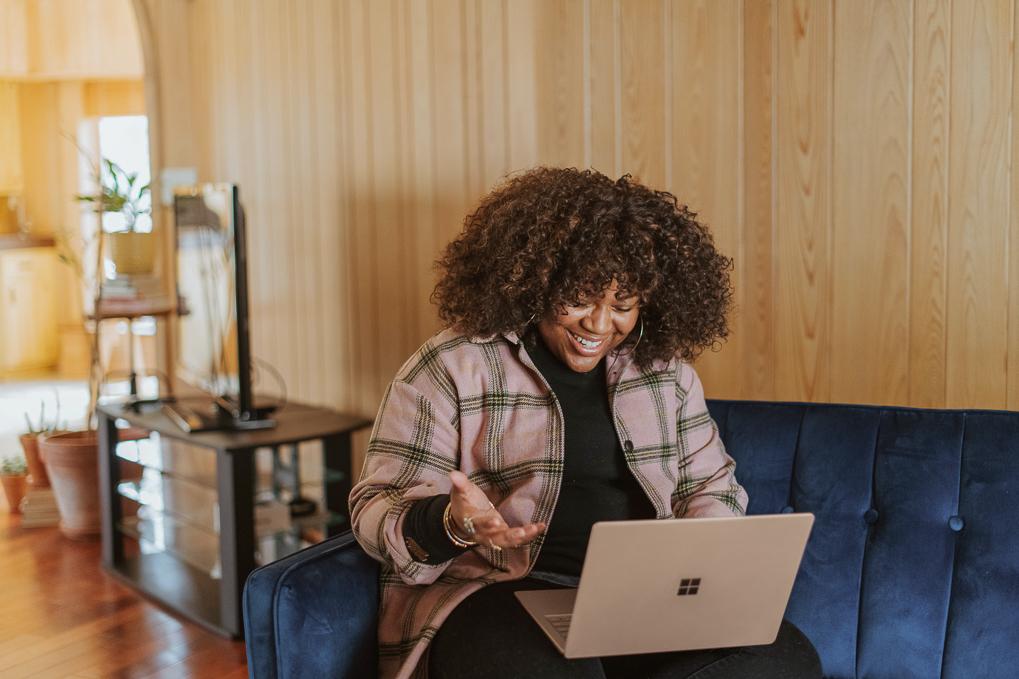TMDSAS Reaches Historic Milestone: Over 10,000 Applications for 2026
TMDSAS application submissions see major growth across medical, dental, and veterinary fields—signaling strong momentum for Texas’s future healthcare workforce.

Interviews for professional school are the culmination of years of preparation and represent an important step in your journey toward becoming a healthcare professional.
Throughout the Courage Sessions, we’ve learned about how the admissions process has been affected by COVID-19. A key change since COVID-19 is the implementation of virtual interviews across the TMDSAS schools. While preparing for an interview used to consist of practicing questions, finding comfortable shoes for walking tours, and taking good notes, the migration to a virtual environment requires you to take some additional considerations.
We've collected the following advice from the AAMC's “Prep for Success in Your Virtual Interview” presentation, the "Zoom Interview Tips for Medical & Dental School Applicants" by Mr. Caleb Marsh from Temple University, the AAMC's "Virtual Interviews: Tips for Medical Applicants" document, and feedback from the dental, medical, and veterinary member institutions.
Typically, in-person interviews would consist of a full day of presentations from the schools’ dean, admissions officers, and student services along with a tour that culminates in either two or more interviews or MMI (Multiple Mini Interview) stations. Some schools may also offer additional activities or opportunities where you could interact with current students and ask questions about their experience.
It’s widely known that the interview starts from the moment you step foot on campus, and ends when you leave at the end of the day. Hosting an interview day takes a robust group of people at the school, including but not limited to:
At the end of the day, the schools need to know that they engage with applicants in meaningful ways to ensure that they are a good fit for the mission of the institution. This extends both ways as you are also making note of whether you believe the school would be a good fit for you.
While the principles of the interview day remain the same, there are some key differences
you need to know about as interviews have moved to virtual platforms.
Depending on the school, some interview days may continue to be provided live each time. This means that presentations and interviews are all taking place at the same time with everyone involved. Other schools may have pre-recorded presentations that you can watch on-demand in preparation for your interview. Some schools may opt to use the AAMC’s VITA (Virtual Interview Tool for Admissions), which are asynchronous meaning that you record your responses to interview questions.
Follow instructions provided by each institution when you are invited for an interview. Don’t make any assumptions about the interview process based on what you may have experienced or heard. If you have any questions or concerns, it’s best to ask the school directly.
You’ve spent years preparing to get to this point; you are there thanks to your achievements and support from faculty, family, friends, and everyone who has ever rooted you on throughout your journey. Make sure that you put your best foot forward throughout the interview.
As you move forward into the virtual interviews, it’s important to keep in mind that the interviews begin from the time you log on until you sign off at the end of the interview day. Some schools may have breaks throughout the day where students can interact with each other, but you should note that you are still at an interview.
Unfortunately, we often hear stories about students who “throw away” their interviews.
If you have no interest in attending a certain school, please make sure to withdraw
your application as that interview opportunity could be granted to someone else in
the applicant pool.
About AAMC’s VITA
(Virtual Interview Tool for Admissions)
Some medical schools have opted to use the AAMC’s Virtual Interview Tool for Admissions, or VITA, as the virtual interview platform. Applicants will have to answer six interview questions that are categorized as personal experiences, past behavior, or situational. These questions are similar to what you may have been preparing to answer, though you will have to record your responses.
Through VITA, there is no human interviewer on the other end. You receive text prompts and record a video or audio response. You will have one minute to read and reflect on the response and then three minutes to record your response. You have the opportunity to record one question or all six in one single session as long as you complete it by the deadline set by the school.
You are most likely to encounter the VITA in out-of-state medical schools. For more information, visit the VITA page on the AAMC website.
Admissions committees undergo significant training in mitigating implicit biases in the selection process. Many schools will go further to keeping their interviewers “blind” to certain aspects of the application such as which school you attend or your admission test score/GPA.
With interviews moving to virtual spaces, similar trainings have been implemented to ensure that applicants aren’t penalized for unexpected interruptions from family/roommates, technical issues, or issues related to your health or unique circumstances. If you have any questions or concerns, please reach out directly to the school for support.

Here’s what you should do to find and/or prepare your space for virtual interviews.
You’ll want a private and quiet space where you’ll be comfortable and alert for your interview day. A great place to start is to check with your health professions advisor to see if there are rooms that can be booked for professional school interviews. If you are not near your campus, local libraries or community centers may be available. If you have a space in your house or apartment, this might be a good option, but there are a few additional considerations.
No matter which location you choose, make sure that you:
When a school reaches out with an invitation for an interview, additional information will be provided to help you prepare. Some schools may offer tutorials to help you set up or do a practice run – other schools may even provide someone who is available for tech support.
Practice good online etiquette by turning off your phone, keeping yourself muted if you are not talking, and upload a profile photo to the virtual platform, and set up your profile with your name. If you go by your preferred name (as you specified in the application), you can update your name as when you set up. For more practical tips, check out Mr. Caleb Marsh’s article.
Know Your ApplicationAt the time of the interview, it may be several weeks since you’ve submitted your TMDSAS Application (and secondary application, if applicable). Download a copy of your application by signing in to your TMDSAS account and clicking on “EY2021 Application." Everything you’ve included is fair game during the interview process. |
In Case of Emergency If anything happens that may impact your interview, contact the school immediately. Make sure you are professional and courteous in your communication. Many schools will anticipate that some issues like internet/power outages and will work with students on a case-by-case basis. |
Make sure you remember how you aligned your application with the Core Competencies (Inside Health Education podcast episode 35) and the school’s mission.
The interview is your opportunity to shine through – at this point, the schools already know that you can handle professional school academically, now they want to see if you’re a good mission fit. On the other side, you are also interviewing the school to see if it’s a good fit for your needs and aspirations.
Does the school offer support services that help you? What questions do you have about living in that area for the next 4 years? Make sure you take good notes to use when deciding where you’d like to attend. These are especially important if you have several interviews and if you participate in the TMDSAS Match.
This is your opportunity to show how your motivation aligns with the school’s mission and values. Bring a list of experiences and obstacles you’ve overcome and use the STAR model (Situation-Task-Action-Response) to help guide your responses.
Throughout the Courage Sessions, admissions members from the TMDSAS member institutions have echoed the need for you to bring your individuality to the application and interview. You are more than a checklist of activities or a test score – let your individuality come through in your interview.
We hope that this advice helps alleviate your concerns about the interviews moving to a virtual space. This year is definitely not typical, but the commitment of our member institutions remains just as strong to ensure a fair and equitable process for all applicants. Best of luck as you head into your interviews!
TMDSAS application submissions see major growth across medical, dental, and veterinary fields—signaling strong momentum for Texas’s future healthcare workforce.
TMDSAS reports a historic high in applications for Entry Year 2026, marking a new record in submissions to Texas medical, dental, and veterinary schools.
Get ready for the TMDSAS Entry Year 2026 application cycle! Find essential updates, new resources like the EY26 Application Guide, important policy changes, and helpful tips to prepare your best application.
Review the guidance provided to best rank your schools, especially if you have a pre-match offer.